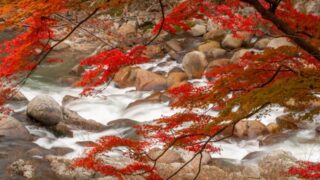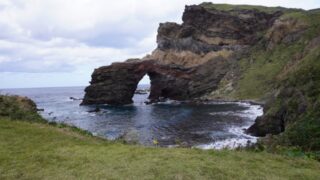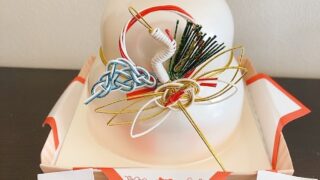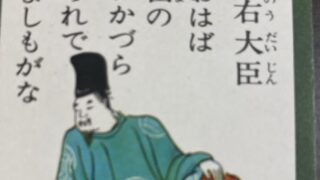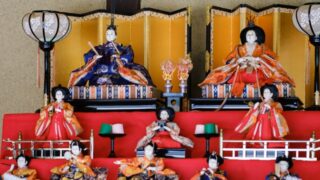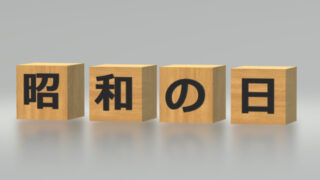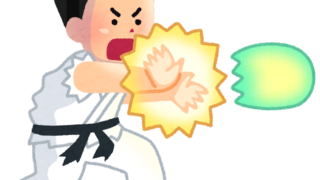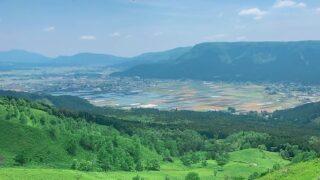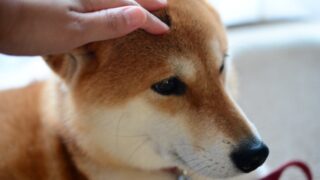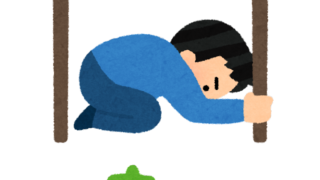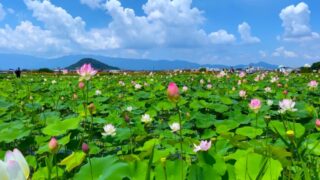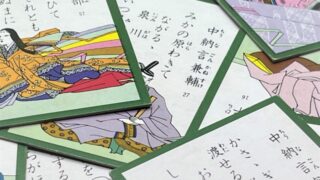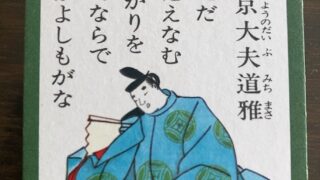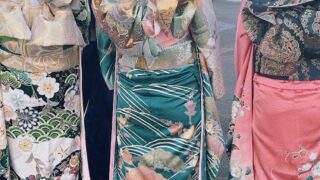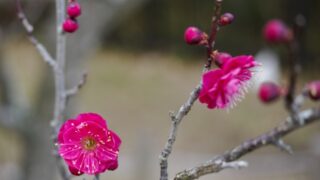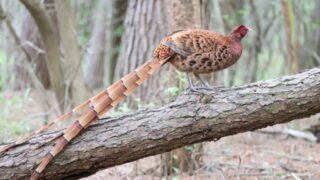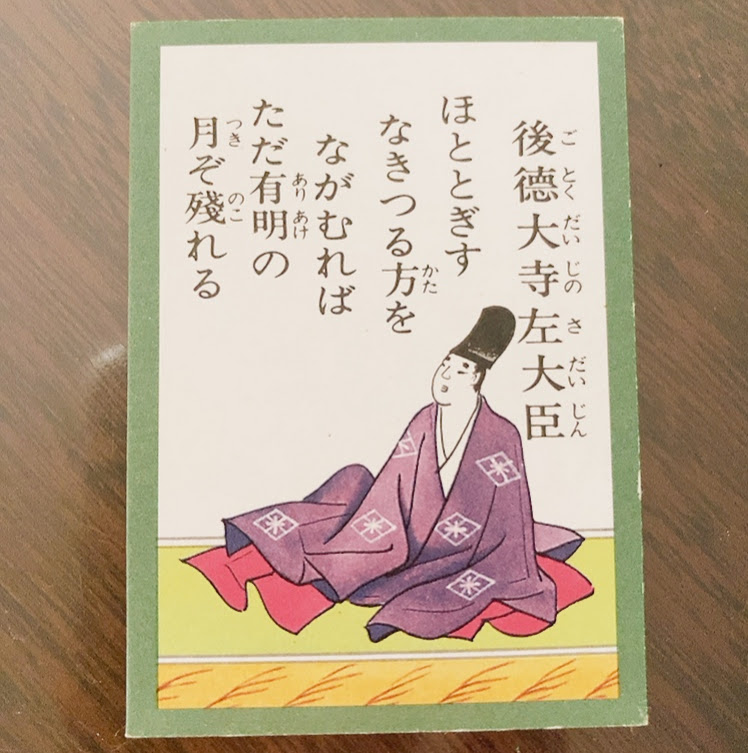ほととぎすは、夏を告げる鳥です。「告げる」とは「知らせる」という意味です。5月の中頃に日本に来て、ヒナ (鳥の子) を育てます。5月から6月にかけて、多くの鳥が子育てをします。
”Hototogisu,” a lesser cuckoo is a bird that heralds the arrival of summer. ”Tsugeru – herald” means to let someone know something. They arrive in Japan in mid-May to raise their chicks. ”Hina” means chicks of birds. In Japan, many birds raise their young from May to June.
ほととぎす 鳴きつる方を 眺むれば ただ有明の 月ぞ残れる
後徳大寺左大臣(1139-1191)
百人一首 八十一番
「千載集」 夏
かな
ほととぎす なきつるほうを ながむれば ただありあけの つきぞのこれる
言葉の意味
ほととぎす a little cuckoo
5月ごろ日本に渡ってくる、灰色の鳥です。朝早い時間に鳴きます。夏を代表する鳥として、よく和歌に詠まれています。この歌が詠まれた時代には、朝早く起きてほととぎすの初音(その年初めて聞く声)を聞くことが流行っていたようです。
This gray bird migrates to Japan around May. It chirps in the early morning. It is often mentioned in waka poems as a bird representative of summer. In the period when this poem was composed, it was popular to wake up early in the morning to hear the first sound of the hottogisu (the first sound of the year).
英語の “cry” は「泣く」、”A bird sings” は「鳥が鳴く」です。どちらも「なく」と読みます。日本語は同じ読み方の言葉が多くて、おぼえるのが大変ですね。”The cat meows” は「猫が鳴く」です。
例 赤ちゃんが泣く。
鳥が鳴く。
The English word “cry” is “泣く” and “A bird sings” is “鳥が鳴く”. Both are read as “なく.” Japanese has so many words with the same readings that it is hard to remember them.
| 鳴きつる方を | 鳴いている方を | at the direction where I thought the bird song |
| 眺むれば | 見てみると | When I look |
| 月ぞ残れる | ただ月が残っているだけだった。 | I found Just the moon remained. |
| 有明の月 | 朝に残っている月 | morning Moon |
言葉の意味
ほととぎすの声が聞こえた。鳴いた方を見てみたけど、明け方の月が残っているだけだった。
I heard the sound of a lesser cuckoo. I looked in the direction of the song, but all I could see was the remaining moon at dawn.
この歌が詠まれた時代は、夏の初めにほととぎすの初音を聞くことが流行っていました。初音とは、その年初めて聞く音や声のことです。
この歌の作者も、ほととぎすの声を待っていました。そして、待っていた声が聞こえます。声がした方を見てみます。でも、ほととぎすは素早く動く鳥です。声のした方を見た時には、もう鳥の姿は見えなくて、明け方の月が残っているだけでした。その時の残念な気持ちを詠んだ歌です。
It was popular to hear the “hatsune” (first sound) of the hottogisu in early summer during the period when this poem was composed.
The author of this poem was also waiting to hear the sound of a lesser cuckoo. And then, he heard the voice he had been waiting for. He looked in the direction of the voice. However, the lesser cuckoo is a bird that moves quickly. When he looked in the direction of the voice, he could no longer see the bird, and all that was left was the moon at dawn. This is a poem about his disappointment at that moment.
テレビもスマートフォンもない時代。春には桜を見て、夏には鳥の声を聞き、それを歌にする。優雅に自然を楽しんでいるように思えますが、娯楽が発展するのは、多くの人がつらい現実から逃げたくなる時です。
An era without TV or smartphones. In spring we see cherry blossoms, in summer we hear birdsong and compose poems about it. It may seem like enjoying nature with elegance, but entertainment develops when many people want to escape from painful reality.
この歌の作者、後徳大寺左大臣は、前回紹介した藤原定家のいとこです。彼らの生きた時代は、貴族中心の社会が終わり、武士中心の社会に変わっていく時代です。貴族の文化が発展する一方、貴族の力は弱くなっていきます。見たくないこと、聞きたくないこともたくさんある中、自然や歌に癒しを求めたのでしょう。どんな気持ちでほととぎすの声を待っていたのだろうかと思います。
The author of this poem, Left Minister Go-Tokudaiji, is a cousin of Fujiwara no Teika, whom I introduced in the previous issue. The period in which they lived was a time when aristocrat-centered society was coming to an end and was being replaced by a warrior-centered society. While aristocratic culture developed, the power of the aristocrats weakened. With so many things they did not want to see or hear, they probably sought solace in nature and poems. I wonder what kind of feelings they must have, waiting for the sound of the birds’ voices.
今日もここまで読んでくれてありがとうございました。人生にはいろんなことがありますね。つらい思いを抱えながら、このブログを読んでいる方もいるかもしれません。みなさんに少しでも穏やかな時間が訪れるように願ってやみません。
Thank you for reading this far today. There are many things going on in your life. Some of you may be reading this blog with painful feelings. I hope that you will find some peace and tranquility in your life.
ほととぎすの声は以下の動画から聞くことができます。
令和六年六月二日
